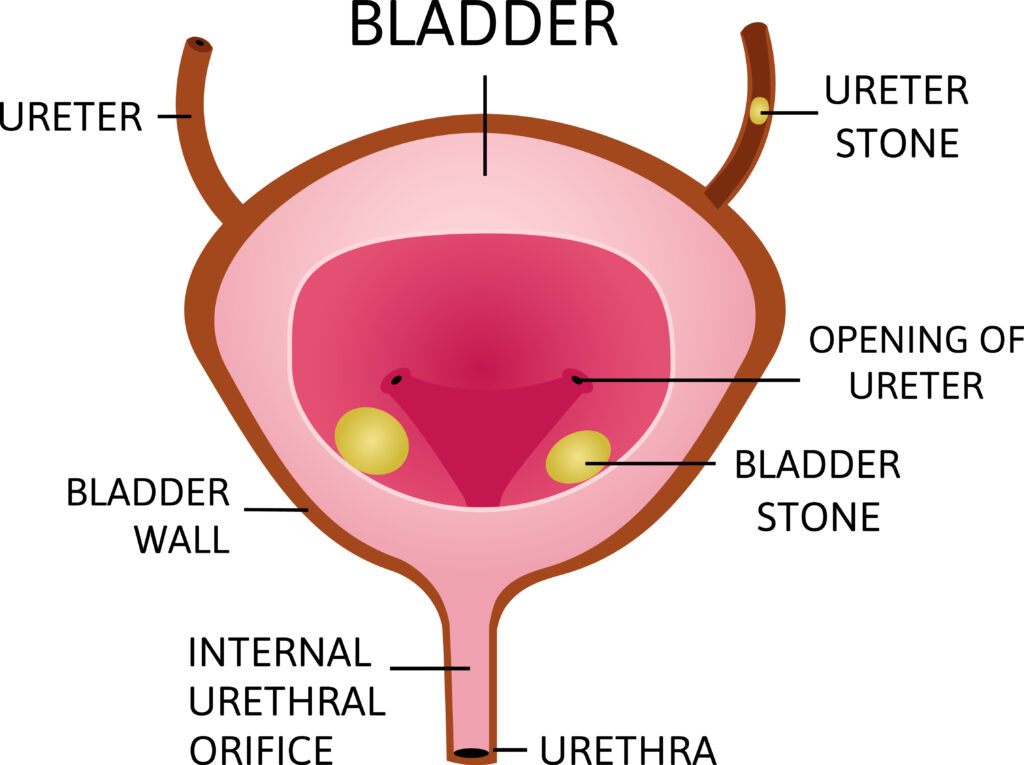
Overview
Bladder stones are hard masses of minerals that build up in the bladder. This mainly occurs when a person does not completely pass urine. The minerals in concentrated urine crystallise and form small “stones.” Bladder stones can be uncomfortable, mainly affecting older males, but treatment options are available.
Small bladder stones may pass on their own through urine. However, some may need treatment and sometimes surgery.
Key facts
- Bladder stones predominantly affect men 50 years and above.
- Underlying medical conditions are more often than not responsible for bladder stones.
- Signs and symptoms of bladder stones include pain while urinating, frequent urination, cloudy or unusually dark-colored urine, and blood in the urine.
- Women rarely experience bladder stones.
Symptoms
Bladder stones might not present any symptoms straight away. However, when the stones begin to irritate the bladder or block urine, symptoms might range from;
- Pain or discomfort in the penis
- Frequent urination
- Interrupted or a stop-start flow
- taking longer to start urinating
- pain in the lower abdominal area
- Pain in the lower abdomen
- pain when urinating
- blood in the urine
- cloudy or dark-looking urine
Diagnosis
Diagnosing bladder stones may involve:
Physical examination: Your doctor may start by feeling your lower abdomen to check if your bladder is distended (enlarged) or perform a rectal to identify problems with the prostate if any. They may also ask about urinary signs and symptoms you’re having.
Urine test: Your urine sample may be collected to be examined under a microscope to check for blood, crystallised minerals, or bacteria. In some cases, a urinary tract infection may be the underlying cause or one of the symptoms of bladder stones.
Your doctor might also perform a cystoscopy by passing a small tube with a camera (cystoscope) through your urethra into your bladder to see if there are abnormalities in it.
Imaging is another option for diagnosis as it can help find the location and size of any bladder stones. It can also spot if the urine is blocked anywhere. Your doctor might use CT, X-ray, or ultrasound.
Causes
The bladder performs the crucial role of collecting urine from your kidneys and store until you need to pee. Once you pass out the urine, your bladder should be empty. However, when other health issues get in the way of this process, you begin to retain pee in your bladder. If this goes on for a while, the minerals in your urine begin to stick together and crystallise until they form bladder stones.
Two major health issues can cause this to happen. They are;
Prostate gland enlargement. An enlarged prostate in men can block urine flow, preventing the bladder from completely emptying.
Damaged nerves: Nerves connected to the brain send signals to the bladder muscles to tighten and release for you to pass urine. If any of these nerves have been damaged by a stroke, spinal cord injury, or other health issues, your bladder might retain urine, leading to bladder stones.
Other causes include;
Medical devices: Bladder catheters ( small devices passed through the urethra to pass urine) cause bladder stones. Objects like contraceptive devices or urinary stents can also accidentally migrate. Minerals in the urine tend to stick to their surfaces and crystallise.
Inflammation: Inflammation of the bladder, sometimes caused by UTIs ( urinary tract infection) or radiation therapy to the pelvis, may cause bladder stones.
Kidney stones: Kidney stones are not the same as bladder stones. However, some might travel to the bladder and form bladder stones if you have kidney stones.
Prevention
If you have recurrent UTIs, you might be more likely to develop bladder stones. To prevent this;
- Increase your fluid intake to lower urine concentration and prevent it from crystallising. 2-3 litres of water is recommended daily
- Regularly empty your bladder.
- Use laxatives to avoid constipation.
Treatment
If you have bladder stones, you may need to drink lots of water to help you pass them out through urine. However, if you struggle with emptying your bladder, this might not work. If you can’t pass them out on your own, your doctor might suggest;
- Breaking stones apart
In this method, you’re given numbing medication or anaesthesia to knock you out before it begins. Once you’re unconscious, a cystoscope is inserted into your bladder to let your doctor see the stone.
Then, either a laser, ultrasound, or other similar device breaks the stone into tiny pieces and flushes them out of the bladder.
- Surgery
On some occasions, the bladder stones may be too large or hard to break. When this is the case, your doctor might suggest surgical removal of the stones from your bladder.
Conclusion
Bladder stones are hard masses of minerals that build up in the bladder when a person does not entirely pass urine. Symptoms range from frequent urination to a burning sensation while peeing and, sometimes, blood in the urine. Bladder stones are treatable and can sometimes be passed through urine
MOST COMMON
